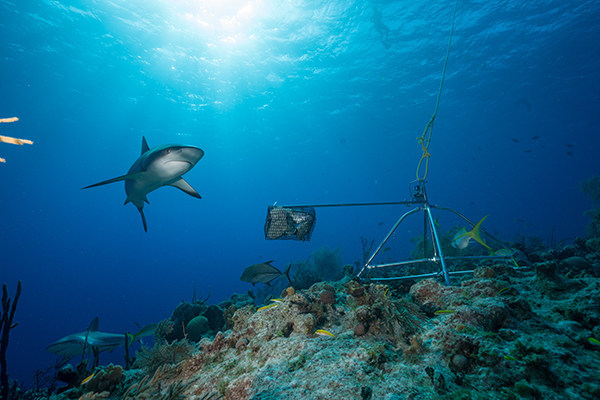
Report reveals sharks are functionally extinct from many reefs
by CM Staff

The report also identified conservation measures that could lead to recovery

Caribbean reef shark and baited remote underwater video system, captured in the Bahamas. PHOTO: Andy Mann/Global FinPrint
SEATTLE — A new study by Global FinPrint, a shark conservation group, reveals sharks are absent on many of the world’s coral reefs, indicating they have become “functionally extinct.”
Of the 371 reefs surveyed in 58 countries, sharks were not observed on nearly 20%. The report also identified conservation measures that could lead to recovery.
Essentially no sharks were detected on any of the reefs of six nations: the Dominican Republic, the French West Indies, Kenya, Vietnam, the Windward Dutch Antilles and Qatar.
“While Global FinPrint results exposed a tragic loss of sharks from many of the world’s reefs, it also shows us signs of hope,” said Jody Allen, co-founder and chair of the Paul G. Allen Family Foundation, in a prepared statement. “The data collected from the first-ever worldwide survey of sharks on coral reefs can guide meaningful, long-term conservation plans for protecting the reef sharks that remain.”
The loss of reef sharks is due to overfishing of sharks, with the largest contributor being destructive fishing practices, such as the use of longlines and gillnets, according to the report.
“Although our study shows substantial negative human impacts on reef shark populations, it’s clear the central problem exists in the intersection between high human population densities, destructive fishing practices, and poor governance,” said Demian Chapman, Global FinPrint co-lead and associate professor in the Department of biological sciences and Institute of Environment at Florida International University. “We found that robust shark populations can exist alongside people when those people have the will, the means, and a plan to take conservation action.”
The study revealed several countries where shark conservation is working and the specific actions that can work. The best performing nations compared to the average of their region included Australia, the Bahamas, the Federated States of Micronesia, French Polynesia, the Maldives, and the U.S.
Researchers are now looking at whether recovery of shark populations requires management of the wider ecosystem to ensure there are enough reef fish to feed these predators.
“Now that the survey is complete, we are also investigating how the loss of sharks can destabilize reef ecosystems,” said Mike Heithaus, Global FinPrint co-lead and dean of the College of Arts, Sciences & Education at Florida International University. “At a time when corals are struggling to survive in a changing climate, losing reef sharks could have dire long-term consequences for entire reef systems.”